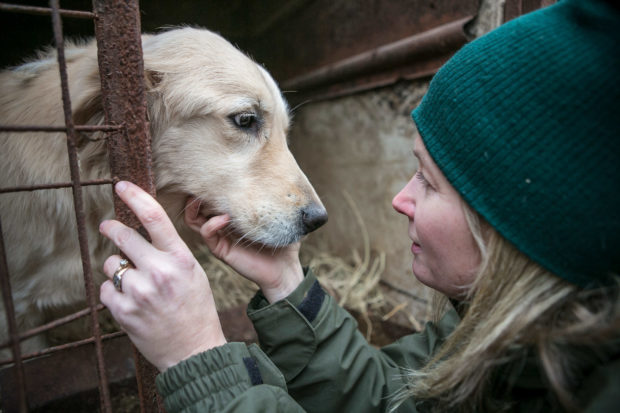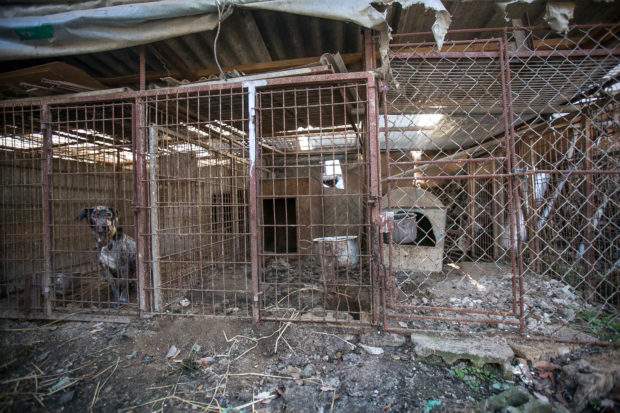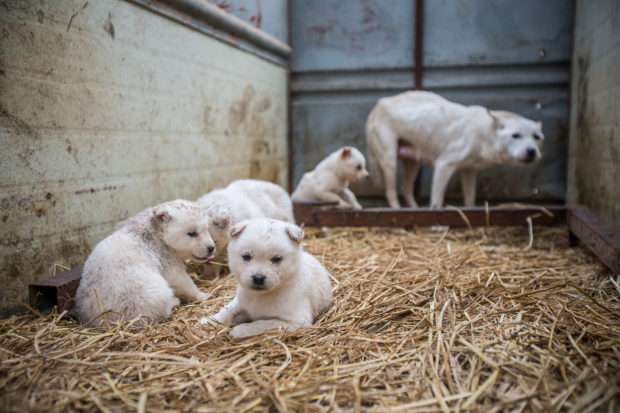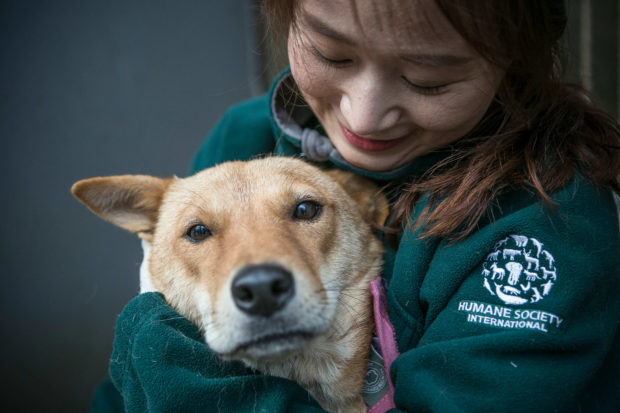
Mia, a beautiful golden retriever who will soon be in the United States, jumped up and gave our team members what has since become her signature “dog hug,” when she was first allowed out of her cage. Pictured above, Mia with HSI Senior Director of Companion Animals and Engagement Kelly O’Meara. Photo by Jean Chung/For HSI
We’re back at it in South Korea, saving dogs from the worst imaginable circumstances on meat farms and starting them on a journey that will turn their lives in the most dramatic ways. It’s the 10th dog meat farm we’ve cleaned out since we started our End Dog Meat campaign.
It is estimated that each year more than two million dogs are bred on thousands of dog meat farms in South Korea for human consumption. This week, we are rescuing 170 of those animals from an unthinkable fate. Soon, we’ll fly them to the United States, Canada, and the United Kingdom where they will be placed with our Emergency Placement Partner shelters and rescues and will receive the care and love they so deserve.
The dog meat farm in Namyangju, South Korea, is typical of these sordid enterprises. The golden retrievers, spaniels, beagles, greyhounds, Korean jindos, mastiffs, and other breeds we found had never received any veterinary care, and many suffer from eye infections, skin diseases, and painful leg and paw sores from days of standing and sitting on the metal wires and bars that make up the flooring of their cages. Conditions only get worse in winter when the metal is freezing to the touch, hurting the dogs’ sensitive paws even more.
At the dog meat farm, the dogs lived in a mish-mash of cages, many hidden behind stacks of wooden and metal debris. The cages were piled high with feces, and there were absolutely no barriers from the cold wind that blows through the farm during Korea’s harsh winters. Photo by Jean Chung/For HSI
Kelly O’Meara, HSI senior director of companion animals and engagement, is on the ground in Korea now, and in an email she described the farm as a mish-mash of cages spread throughout the property, many hidden behind stacks of wooden and metal debris. The dogs lived in cages piled high with feces, and there were absolutely no barriers from the cold wind that blows through the farm during Korea’s harsh winters.
Despite their debilitating circumstances, many of the dogs showed incredible resilience and a loving attitude toward humans. Mia, a beautiful golden retriever who will soon be in the United States, jumped up and gave our team members what has since become her signature “dog hug,” when she was first allowed out of her cage. Leila, a jindo mix, melts into a pool of mush in the laps of our caregivers each time they visit her, showing them her belly for petting. Angel, a mastiff mix, leans into her visitors and snuggles as close as she can while being petted.
Limited by the space available on airlines willing to transport them, the dogs are now patiently awaiting their turn to get off the farm and head to their new lives overseas. Our team members visit with each of them daily and have offered as much comfort as possible during the process of closure. We have provided straw bedding in each cage to give them some insulation from the cold, and it’s amazing to behold. Something as simple as straw in their cages has them playing and romping around, digging their noses into the first element of enrichment and comfort they have ever received in their metal prisons. As one rescue team member said, “There is little reward as wonderful as watching a dog snuggle into a bed of straw and feel the first warmth and comfort in their life.”
Something as simple as straw in their cages has the dogs playing and romping around, digging their noses into the first element of enrichment and comfort they have ever received in their metal prisons. Photo by Jean Chung/For HSI
The HSI rescue is happening just 10 weeks shy of the 2018 Winter Olympics, which will be hosted by South Korea. As the world’s attention focuses on this event, we also hope to turn the spotlight on the suffering of companion animals in South Korea’s dog meat farms. This is a grim, shocking, and largely hidden side of South Korea that stands in stark contrast to the colorful pomp and ceremony we will no doubt witness at the Olympic festivities, and one that a growing number of South Koreans believe has no place in their modern, progressive society.
HSI has been working for nearly three years now in South Korea to close dog meat farms, and for some very elderly dog farmers, HSI intervention has meant that they can finally retire without having to sell their dogs for slaughter. Other farmers have worked with HSI to devise a business plan to transition to alternative, humane livelihoods such as water delivery or crop farming.
The owner of this dog meat farm in Namyangju will now grow vegetables on his land, instead of breeding dogs.
Leila, pictured above with HSI’s South Korea Campaign Manager Nara Kim, melts into a pool of mush in the laps of her caregivers each time they visit her, showing them her belly for petting. Photo by Jean Chung/For HSI
As gratifying as it is to rescue each animal from their misery, we are also aware that given the large number of dog meat farms in Korea, we cannot tackle this problem entirely on our own. What we hope to do is provide the government of South Korea with a blueprint to help dog meat farmers transition out of this gruesome trade and into more humane livelihoods. We also are working on legislation that seeks to phase out and end this terrible business once and for all.
Increasingly we find that young Koreans are rejecting eating dogs. Most South Koreans don’t regularly eat dog meat and oppose the practice. South Korean President Moon Jae-in has adopted a dog named Tory who was said to be rescued from a dog meat farm. Besides closing dog meat farms, HSI is raising awareness among South Koreans and earlier this year we took our campaign against dog meat to the streets of Seoul, with posters on subways and a virtual reality experience showing life on a dog meat farm.
“Eating dog is already a declining habit in South Korea, but if people could see the sorrow of these dogs and the disgusting unhygienic conditions in which they’re raised,” Nara Kim, HSI’s South Korea Campaign Manager, told me, “I think even more people would stop eating them.”
The post HSI closes 10th dog meat farm in Korea, rescuing 170 dogs appeared first on A Humane Nation.
Enviroshop is maintained by dedicated NetSys Interactive Inc. owners & employees who generously contribute their time to maintenance & editing, web design, custom programming, & website hosting for Enviroshop.



